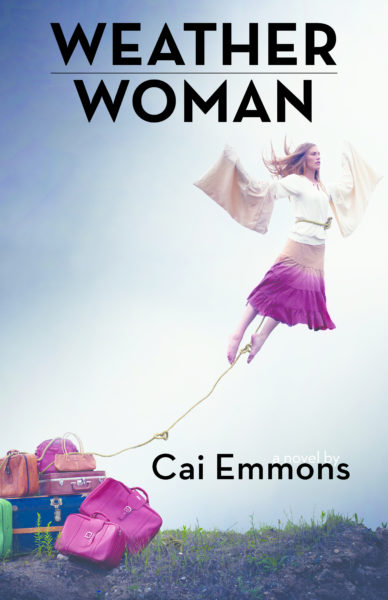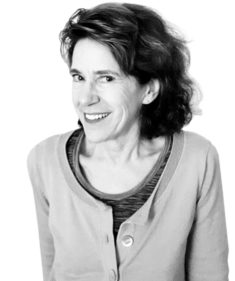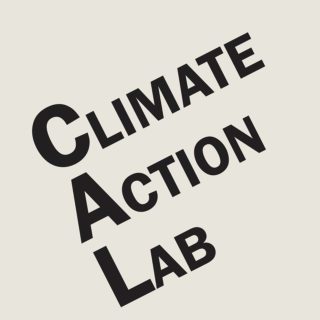Weather Woman by Cai Emmons is a Climate Fiction novel about the life of Browyn Artair, a graduate student turned meteorologist who discovers she possesses the unique ability to control the weather. Feeling isolated and unsure of how to use her newfound power, she voyages around the world to Siberia where climatologists are studying methane emissions at the Arctic Cloud Project. Her journey also leads her to Tornado Alley in Kansas, the wildfires of Los Angeles, and other sites of environmental harm. Browyn must decide how to make use of her power without hurting the earth further. She also has to face the fact that she can’t save the earth alone. She comes face to face with climate change discourse and confronts questions that affect all of us—what is one’s personal responsibility to the earth? How do we deal with the media’s continual denial of climate change and take action to preserve our shared home?
These are just a few of the questions that the Center for the Humanities’ Climate Action Lab (CAL) works to answer. CAL is an initiative that brings together activists, researchers, journalists, artists, and other academics to discuss and respond to compounding environmental crises. No person or nation is immune to the catastrophes we currently face. The lab works to imagine and create alternative futures and just solutions, always aware of the way social inequity and climate chaos are interwoven. As a writer and CAL participant, I’m very interested in how to use the vehicle of literature to inspire awareness and action. I believe that the humanities play an important role in climate action by allowing people to enter the minds of characters who are dealing with the reality of climate change. A novel has the power to inspire deep empathy and action.
Weather Woman is an extraordinary novel that reveals the complicated social psychology of climate change discourse. Emmons took the time to discuss the challenges she faced while writing this book, her views on the role literature plays in raising awareness about climate action, and what she hopes her readers will do to actively fight the permanent, ongoing, and inescapable environmental crises facing us all.
INTERVIEW WITH CAI EMMONS
Madeleine Barnes: What prompted you to write about a character who controls the weather?
Cai Emmons: I grew up in New England where weather can change on a dime. I sometimes felt bad weather was my fault, and I wished I could change it. I would look up at the clouds and imagine maybe I was changing it. Eventually this longing gave rise to a character who really can change the weather.
MB: You have a way of writing about the weather that makes the reader feel almost as moved by it as Bronwyn is. How much research did you do into meteorology and climate change in order to write this book?
CE: As soon as I thought of the idea for this book it was apparent that a great deal of research would be necessary. While I have always been very interested in science, I have very little science background (early on I gravitated toward the arts). So, I tried to play catchup. I began with a 24-lecture DVD series from Great Courses, called “Meteorology: An Introduction to the Wonders of the Weather” taught by Robert Fovell of UCLA. This was a terrific introduction to the field of meteorology. Other standouts in my research were books by Elizabeth Kolbert, Bill McKibben, Craig Childs, Fred Pearce, among others. I read bits and pieces in physics texts that were way beyond me. I came across a gem of a book called The Cloud Collector’s Handbook by Gavin Pretor-Pinney, which contains pictures and descriptions of every kind of cloud. I talked to numerous science people including our local TV meteorologist, Candace Campos, now at News 6 in Orlando. And while browsing climate scientists on Twitter I began a dialogue with climate scientist Jason Box (he was featured in Rolling Stone as “The Ice Maverick”), which led to my traveling to Greenland in his company, a great privilege.
MB: There is an overall sense of positivity and generosity towards the world in the book. It’s striking because writing about things like climate change, or people just living their lives, in literary fiction often falls prey to a kind of reflexive negativity/cynicism. Did you set out to convey that tone?
CE: Bronwyn feels deeply connected to the earth and appreciates the multitude of its expressions, even the destructive ones. I hope the reader will also marvel at the might and the beauty of the earth’s forces, and realize that those forces are far more powerful than humans are. In all honesty, while I hold a rather bleak view regarding the probability of human survival, I am an upbeat person in day-to-day life, and I think the book’s tone emanates from that.
MB: When Bronwyn finally accepts her abilities, she must take responsibility for what she does—and doesn’t do—to help the world. In many ways it’s a story about women and power, especially new-found power, and about what humans must do to heal the earth. Can you talk about that?
CE: Yes, I definitely feel the over-arching theme of the book has to do with a woman wrestling with her power and trying to find the best expression for it. First, can she really accept herself that she has this power? Then: Who can she tell? Will she be believed? What will others think? Finally, what will she do with this power? For a shy, self-doubting woman who has been mocked in a graduate program, these are difficult questions to answer, but she muddles through, as we all do. The primary question Bronwyn faces is the same question we all face going forward: We do have power, but how do we use it? A corollary of that is: How do we best heal the earth? Is it the purview of one individual?
MB: I loved how the characters were all mature and responsible adults, and yet were still allowed to embrace change and discovery and wonder. It wasn’t a story about people being stuck, but rather being unconventional by choice.
CE: Bronwyn and Matt are both people who are reconsidering their choices and trying to find lives that are more in concert with who they see themselves to be. For this reason, they are open to change and discovery. Eventually, due to their influence, Diane, too, begins to rethink her choices. We have a tendency to think of life as moving forward along a straight linear path, plateauing sometime in mid-life, but in actual fact our lives often take radical turns, veering in new directions, possibly because we’re responding to something that has unexpectedly presented itself, or because we’re looking for something more satisfying or more authentic. Sometimes, when people appear to be stuck, they are not actually in stasis, but at one of these pivotal moments of change where a great deal is happening, at least internally.
MB: What is the role of literature in raising awareness about climate change issues?
CE: I think the most effective role literature can play in changing consciousness is to educate subtly and pose questions. People do not change when they are brow-beaten and lectured to. Solutions for addressing climate change are complicated and multi-faceted. Politicians must understand that it is in their interests to legislate boldly; the body politic needs to be encouraged to act collectively; technologies must be developed. There are numerous ways that individuals can participate. Literature can explore some of the unexamined consequences of climate change and, because it is an emotional medium, possibly stir people to action.
MB: I'm part of a project that is trying to think up concrete actions that people can take to address climate change. What are some ways you hope that your readers will take action to combat climate change and its impacts?
CE: It is my hope that the novel makes the point that we must collaborate to attack this colossal problem. This is what the white fox is trying to tell Bronwyn near the end of the novel. “Where are your people?” he asks. In other words, you can’t save the world alone. Individual actions--recycling, or purchasing an electric vehicle, or becoming a vegetarian—while laudable, are not going to change the status quo. The crisis is so dire that we must act collectively, demanding that our institutions and politicians change their behavior. This might take the form of lobbying, protesting, organizing divestment campaigns, etc. For most of us, it is easiest to do these things in conjunction with an organization like 350.org that has already analyzed where pressure might be most effectively applied to reduce our use of fossil fuels.
With many newly elected Democrats in Congress, we are in a particularly advantageous position to put pressure on our representatives to set a strong climate agenda. We must be noisy advocates so they make climate initiatives (fossil fuel regulations, etc.) a priority. So often the climate agenda slips to the back burner, as it is such a diffuse issue and because the Earth cannot lobby for itself.
Also, we must not shut up. We must talk to friends and family about how important it is to focus on climate issues. I don’t think we should worry about convincing climate change deniers that the situation is dire—instead we need keep the conversation and hope alive among people who understand what is happening but often feel helpless. Despair will do us in.
Note: Portions of this interview were created in collaboration with Andy Davis.



